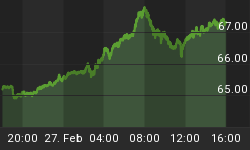Based on the December 2013 Market Overview report
In the last Market Overviews (and also to a considerable extent in the last several Premium Updates) we have discussed in detail differences between tapering and tightening. As we have stated, a personal change of the Fed's chairman will not change the essence of its policy. Now we hear that some form of tapering will indeed happen. Despite this we have three varied tools to consider about some forms of backing out from its expansive policies:
- Federal funds rate
- Government bond purchases
- MBS purchases
The history since 2007 tells us that the short-term interest rate is lying safely at the bottom. All Fed's press releases since the end of 2008 indicate to us that they will stay that way. Since Fed's officials finally got bored with giving dates that are constantly prolonged, we finally received some precision: interest rate hikes may come if the unemployment is below 6,5 percent, and/or the official inflation rate is over 2 percent. Let us emphasizes again the word "may". Those conditions are not here, and even if they were, still it does not automatically mean that the hikes would happen.
Before the interest rates are raised, the asset purchases tool will be settled. First, let's contemplate government securities purchases. Will they be permanently reversed? With all those nice programs extended and initiated by president Obama, we doubt that. The history since 2009 tells us that purchases were slowed down, but not reversed. The public spending tells us that they probably won't be completely reversed in the near future. The public debt tells us that they will not be stopped. One thing that could indicate decreases of government bond holdings are yields on government bonds. At least this was the case until May of 2013. In the last testimony of the Fed we learned that purchases are to be slowed down from 45 billion to 40 billion. Not a sparkling change, really.
In terms of bond returns the policy of boosting government bonds holdings has been a major "success". The monetary pumping worked - the newly created money went indirectly into the Treasury. For the 10-year government bonds, yields were brought down from 5 percent in 2009 to 2.6 percent in May of 2013. Then the reversal in yields happened, probably because of possible "tapering" hanging in the air. Under these circumstances we are back at levels similar to mid-2011. And in mid-2011 the Fed was holding on to government assets. Since the yields of over 3 percent are back we do not expect to see major shifts in this part of Fed activity, even if number "5" is to be seen somewhere (that is a difference between 45 and 40 billion of asset purchases).
Another likely candidate for tapering were asset purchase operations performed on MBS. Here the Fed decided to buy 35 billion each month instead of the previously declared 40, to thus slightly reduce the holdings. Yet as all Fed representatives signaled to us, these are not to be major changes but minor adjustments.
But, most importantly, this will not mean the reversal of the easy money policy. Easy monetary policy is still the only option on the table. All that is being debated by Fed's officials are the ways and means of easy monetary policy. Not the essence.
Thank you.















